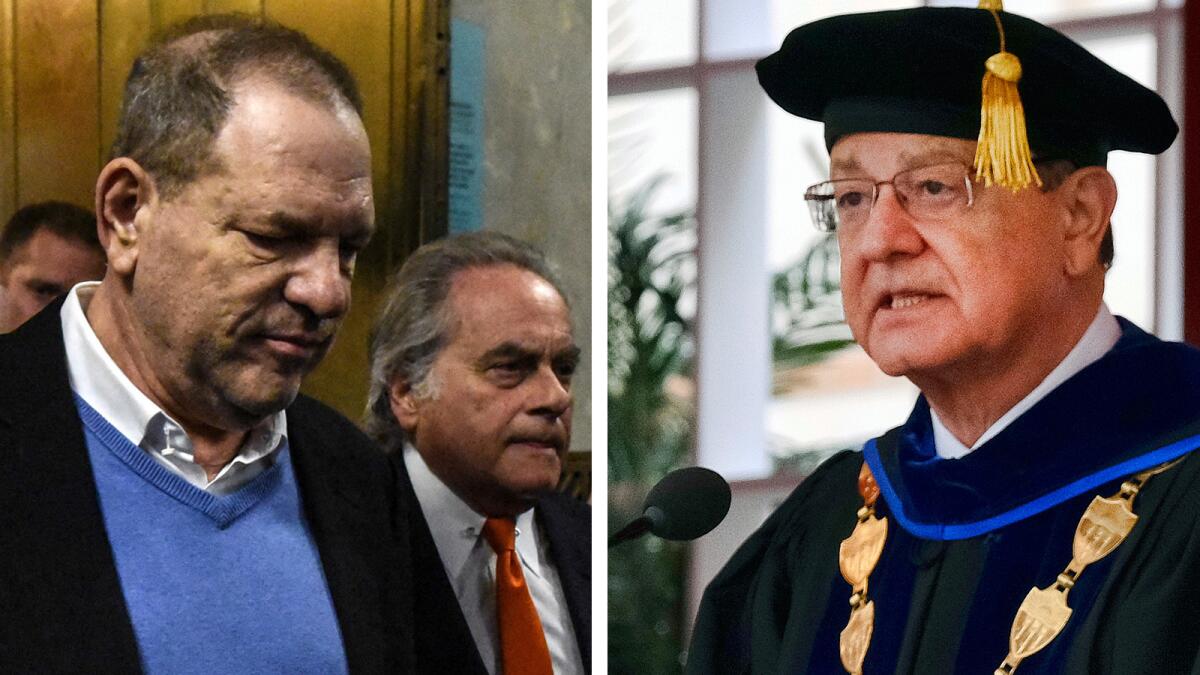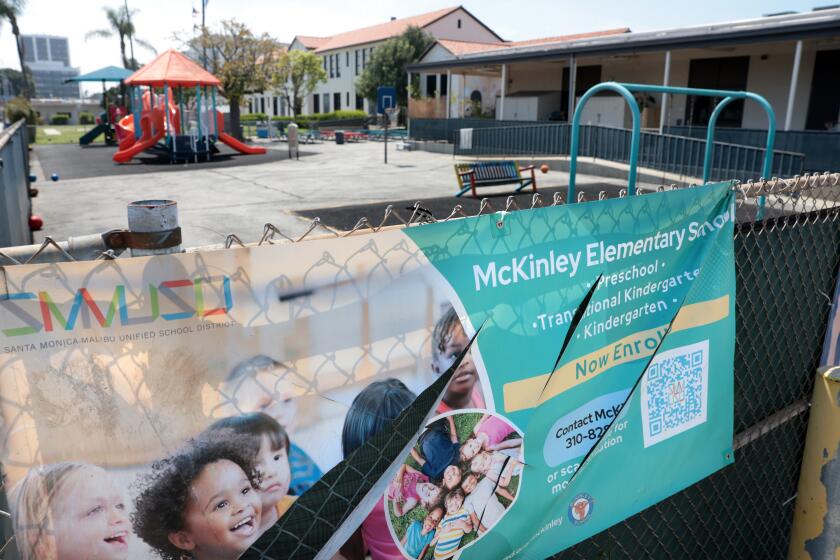Column: The end of Max Nikias’ scandal-plagued tenure should push USC trustees to do some soul-searching

Technically speaking, it was a coincidence that USC President C.L. Max Nikias agreed to step down on the same day that disgraced movie mogul Harvey Weinstein surrendered himself to a courtroom in lower Manhattan.
In the greater scheme of things, however, it was a bicoastal convergence of karmic comeuppance.
Finally, law enforcement did the right thing by charging the heinous Weinstein with rape and sexual assault.
And finally, the USC Board of Trustees (some of them, anyway) did the right thing by realizing that the only way to restore trust in this tarnished university was to make a clean start.
Before you dismiss the comparison between Weinstein and USC, let me just say this: What we have learned from the scandals that have enveloped USC in the last year — the meth-using medical school dean, the gynecologist who stands accused of the sexual abuse or harassment of several hundred patients — is that you do not have to be the actual abuser to create a culture in which abuse can flourish.
What Weinstein is alleged to have done is unspeakable.
But Nikias did something terrible, too.
He turned a blind eye to malfeasance on his watch. Or he minimized it, excused it and ultimately, covered it up by failing to make the right choices. He created a management culture that subordinated the welfare of students to the university’s material goals, and he cultivated a board of trustees that seemed to answer to him, rather than the other way around.
Former medical school dean Carmen Puliafito, a retina surgeon, should never have been allowed to stay at USC, or accept new patients, after his drug and alcohol abuse and hard-partying behavior became known to the president.
Gynecologist George Tyndall should never have been allowed to slip quietly into retirement — with a secret payout — without being reported to the California Medical Board, something USC at first said it was under no legal obligation to do. His former patients should have been notified of the accusations against him, and the school should have launched an investigation without being pushed into it by news stories filled with sordid details about long-ignored complaints.
So many awful details about Puliafito and Tyndall were uncovered in the course of investigations by my colleagues.
But one I can never shake is the story about the whistleblower who called Nikias’ office to inform him that his medical school dean had been present in a drug-strewn Pasadena hotel room with a prostitute who overdosed and was taken by paramedics to a hospital. USC officials claimed that two receptionists who took the phone calls did not find the information credible and never passed it on to the president.
Does that seem even remotely plausible to you?
USC and its president have been on a collision course with accountability for a long, long time.
::
For a few days, it seemed as if the USC Board of Trustees — which is large, unwieldy and does not include any faculty or students — was going to dig in its heels and refuse to act.
On Tuesday, John Mork, the chairman of the board, said the trustees’ executive committee had “full confidence” in the “leadership, ethics and values” of the USC president.
“I thought that was appalling and shameful,” said English professor Hilary Schor, who co-authored a letter, signed by 500 faculty members, demanding that Nikias resign or be fired. “It was a singularly tone-deaf response.”
You know what else was appalling and shameful? Not a single other trustee spoke up — not to express sympathy for Tyndall’s accusers, nor to vow to get to the bottom of how a campus gynecologist could continue to treat young patients for nearly three decades despite repeated complaints of misconduct. Where was their humanity? Their compassion? Their leadership?
Three days later, however, after a deluge of criticism, the board found its voice.
In a letter addressed to USC faculty, staff, students and alumni, trustee Rick Caruso, the billionaire Los Angeles shopping mall developer, announced on Friday the long overdue end to the Nikias era.
“We have heard the message that something is broken and that urgent and profound actions are needed,” Caruso wrote. “Our focus remains on offering support and counseling to those impacted, investigating what happened, and listening to and healing our community.”
They should also do some soul-searching. Who, really, are they on the board to serve?
::
A few hours after Caruso’s announcement, I reached Schor. She was, needless to say, in a celebratory mood.
“My first response was just pure joy,” she said. “I felt that the trustees really heard our voices. Caruso spoke up for the USC that I believe in and that I have worked to build for 30 years. We haven’t lost sight of that USC and its values.”
Universities are where young people learn to move through the world with knowledge, confidence and the ability to think critically. But universities also have an obligation to teach young people to behave ethically. Hiding scandals, ignoring wrongdoing and allowing terrible behavior to fester is how you create a generation of cynics.
USC is better than that.
And it’s finally taken a first step down the long road to prove it.
Twitter: @AbcarianLAT
UPDATES:
2:35 pm: This column was updated with the number of faculty members who signed a petition calling for the ouster of USC President Max Nikias.
This column was originally published at 5:00 a.m.




